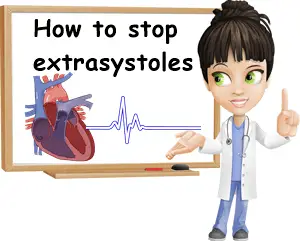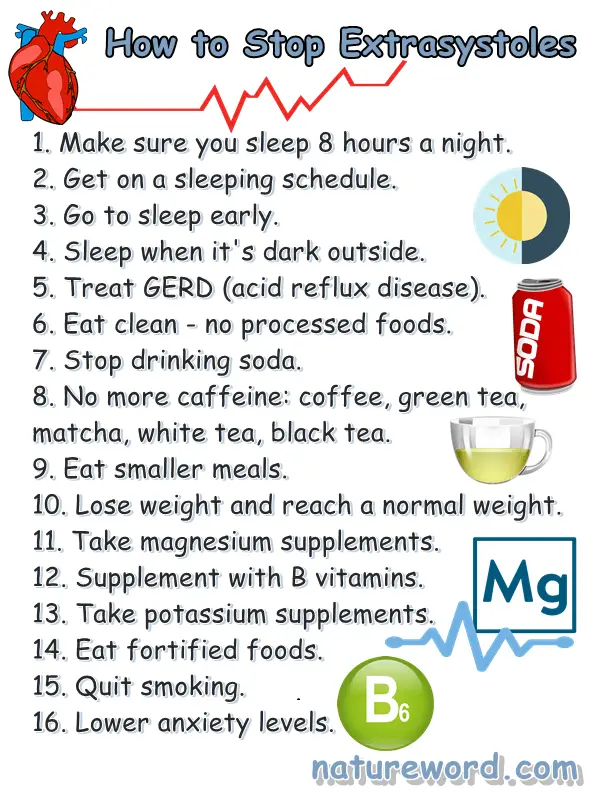Extrasystoles can be one of the most daunting experiences. While harmless in most cases, they do not feel so. But because they interfere with normal life and reduce the quality of life, people naturally want to stop experiencing them. But how do you stop extrasystoles? Below I describe 16 actions you can undertake today to reduce or stop extrasystoles altogether.
How To Stop Extrasystoles (16 Tips To Follow)
1-Get on a sleeping schedule
If you have extrasystoles and want to know how to stop them, then one of the first things to start doing is to get on a sleeping schedule. Our bodies thrive on discipline and a sleeping schedule might just be the thing that stops your extrasystoles. The benefits of having a sleeping schedule are a shorter time falling asleep, a more restful sleep at night, less waking up in the middle of the night, and no snoozing the alarm in the morning because you’re too tired.

It will take around 2 weeks of consistent discipline to get your body on a sleeping schedule. But once it becomes a habit, it will help reduce your stress levels and improve your sleep quality which can help reduce and even stop your extrasystoles altogether.
2-Sleep your 8 hours a night
How much you sleep can make a world of a difference for you if you have extrasystoles. Different people can get by with a different number of sleep hours: some can function with only 4 or 5 hours of sleep per night, while others need the usual 7 to 8 hours, or even more than that. But both sleeping too little and too much is not a healthy thing, and your body can feel it.
In fact, your nervous, endocrine, vascular and muscular systems are the first to show signs, whether it’s aches and pains from spending too much time in bed, or being irritable or far too easily annoyed at everything, stressed, anxious, lethargic, sluggish, agitated, foggy-brained, underproductive, physically and mentally tired from insufficient sleep. All of these are common causes that trigger extrasystoles, and make them worse.
About 8 hours of sleep, which is one third of your day, can bring about significant improvements to your physical and mental health, eliminating some of the main causes and biggest triggers for extrasystoles. Sufficient sleep can regulate the endocrine system, nervous system function and muscle activity, optimizing energy levels, balancing hormone production, boosting mood and productivity and enhancing performance.

3-Go to bed early
If you have extrasystoles, then sleeping when it’s light outside can mess up your body’s natural circadian rhythm and result in physical and mental changes that alter your hormone production, raise your stress levels and affect your brain, muscles, and heart, among others. One of the side effects is extrasystoles.
The human body is made to sleep when it’s dark outside, so making sure you get all of your sleep at night can significantly improve your health and wellbeing. Going to sleep at 10 p.m. or even 11 p.m. can help reduce stress levels, lower anxiety, up sleep quality and stop, or at least reduce, extrasystoles. And if that is something you feel you cannot do right now, then a sleeping schedule is the answer.
4-Combat acid reflux and heartburn
What a lot of people don’t realize is that stomach upset can produce side effects that are projected on systems other than the digestive system and organs other than the stomach.
That’s why heartburn is commonly mistaken for a heart attack, and why indigestion causes people to run to the hospital emergency room.
Another symptom not normally associated with stomach upset is extrasystoles. When you experience acid reflux and heartburn as a result of stomach juices and even undigested food being regurgitated, that causes wild side effects such as palpitations, heating, sweating, redness, chest pain and extrasystoles. To stop extrasystoles, it’s important to combat acid reflux and heartburn which you can do successfully by eating the right foods.
Find out what foods to eat and to avoid for acid reflux.
5-Stop drinking soda
Soda, fizzy drinks or carbonated beverages appear almost innocuous. What that means is that they are not traced back to most of the side effects they actively cause. For instance, everybody knows sodas are full of sugar which causes inflammation and weight gain. But close to nobody knows that sodas cause acid reflux, heartburn, laryngospasms, asthma attacks, palpitations and extrasystoles of the heart.
Because they are carbonated, sodas seem to help aid digestion, especially the digestion of heavier foods. And they do. But at the same time, drinking soda fills up the stomach and makes food and stomach juices regurgitation more likely, leading to acid reflux and heartburn which are also triggers for extrasystoles.
Another reason soda is bad for extrasystoles is because it often contains stimulants, primarily caffeine, which has a highly excitative effect on both the nervous and cardiovascular system. Essentially, caffeine in soda accelerates physiological activity at the level of the nervous system and heart, resulting in symptoms such as palpitations, extrasystoles and other forms of arrhythmia, but also agitation, restlessness and hyperactivity, insomnia and sleep problems that are conducive to increased anxiety and stress levels, triggers for extrasystoles. Expect benefits to start showing between 3 and 6 months after you stop drinking soda.
6-Quit caffeine
Coffee, soda, green tea, black tea, white tea, oolong tea and tea blends such as orange tea or jasmine tea which also contain black tea, matcha, cocoa, chocolate and chocolate-candy all contain stimulants such as caffeine, theine, theobromine. What caffeine and other stimulants do is overstimulate the nervous and cardiovascular systems. Overstimulation is both a cause of extrasystoles, and an enabler via increased psychomotor agitation. Quitting caffeine altogether may feel rough for the first few weeks, but it’s one of the best things you can do to stop extrasystoles.
7-Eat clean
There’s no official definition for ‘clean eating’. But we wouldn’t be wrong to say that clean eating means eating foods as close as possible to their natural state. Instead of cold cuts such as salami, pastrami or sausages, it’s chicken legs or chicken breast, ground turkey meat or beef. Instead of pastry with spinach stuffing, it’s just spinach. Instead of pizza or pie, jam or chocolate candy, it’s a piece of fruit.
Once you start to eat clean, you’ll like it and choose it over eating overly processed foods. And once you body is cleansed of overly processed food, it will function in the most desirable way. Some of the benefits you will enjoy include better blood pressure numbers and healthier cholesterol levels and profile, less water retention and associated puffiness, weight loss and improvement of arrhythmias such as benign palpitations and extrasystoles.
8-Eat smaller meals
It’s not uncommon for extrasystoles to happen after eating. Extrasystoles after eating can have several causes, such as the choice of food, pre-existing conditions such as GERD or acid reflux, or something as simple as the amount of food consumed in one sitting. Even if it might not seem like it, most of us tend to eat more than we need. Since satiation takes a little longer to install, we are in fact overeating a lot of times. Setting a limit to how much we eat in one sitting, that is, portion control, can help reduce and potentially even stop extrasystoles.
9-Reach a normal weight
Excess weight, even if it’s just slightly above normal weight, can come with a whole set of side effects, including water retention and puffiness, lower exercise tolerance, feeling out of breath, acid reflux, more frequent asthma episodes, and even extrasystoles. If you have extrasystoles, then losing weight to reach a normal weight can make a big difference.
10-Supplement with dietary magnesium
Magnesium has almost immediate and measurable effects on the nervous system and muscles. Taking magnesium supplements, even just once, can visibly calm agitation and lower anxiety by inducing relaxation, relieve muscle spasms and painful muscle cramps, lower blood pressure numbers, lower heart rate, induce sleep and stop extrasystoles. And while any form of magnesium that you have in a time of crisis is the best magnesium, you can try different formulas to see which is the best absorbed form of magnesium for you.
11-Pair magnesium with a potassium supplement
The average person needs 4,700 mg of potassium a day, or 4.7 grams. And most people don’t meet their daily requirements at all. But is you supplement with even as little as 1%, there will be visible benefits for conditions affecting the nervous and cardiovascular systems in particular, such as high blood pressure and arrhythmia or extrasystoles.
12-Take your B vitamins
Did you know that your heart and muscles need B vitamins? Taking a B vitamin supplement, with generous amounts of all B vitamins, can help the heart function optimally and reduce or stop extrasystoles. And because B vitamins are water-soluble, you don’t run any risks of toxicity because your body doesn’t accumulate them.
13-Consider fortified foods
Fortified foods are always a good idea. Most foods are fortified with water-soluble vitamins and minerals. That means you pee what you don’t use immediately. There’s really no fear of side effects such as toxicity because water soluble vitamins and minerals in fortified foods don’t accumulate in the body. But also eat normal food amounts.
14-No more nicotine
Smoking causes heart disease, worsens atherosclerosis and high blood pressure, palpitations, extrasystoles, causes lung cancer and increases the risk of other cancers, to name a few of its many side effects. There’s absolutely no good reason why you should be smoking, especially if you have extrasystoles.
15-Limit cocoa and chocolate
Cocoa, chocolate and cocoa and chocolate byproducts can both cause and worsen existing extrasystoles. The culprits are organic compounds occurring naturally in cocoa such as caffeine and theobromine. Caffeine and theobromine have a stimulant effect on the nervous and cardiovascular system, and can cause extrasystoles and other forms of arrhythmia, as well as worsen them by generating triggers for them (e.g. insomnia, agitation).
16-Manage your anxiety
It might seem like a silly question to ask, but can anxiety cause extrasystoles? Yes, it definitely can. Extrasystoles of the heart are not a physical illness, or a mental one for that matter. They are more of a disruption of normal cardiovascular function and the disruption can start either in the body or the mind. Reducing anxiety levels can help reduce or stop extrasystoles.
